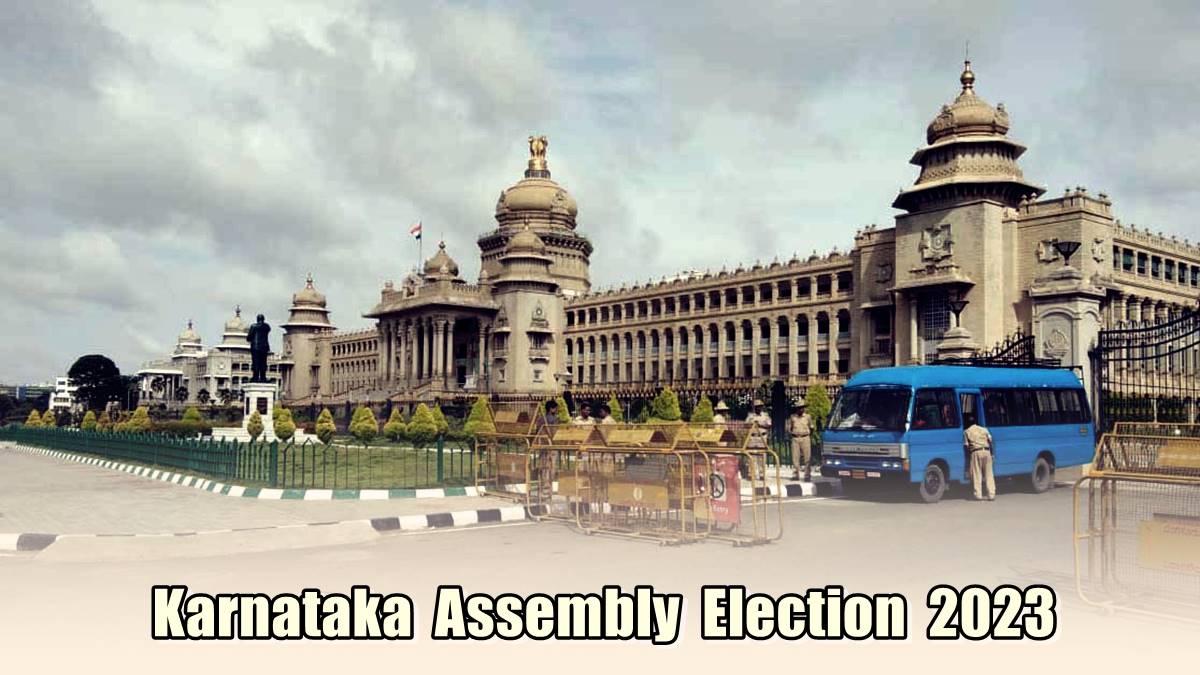- By Sukanya Saha
- Sat, 13 May 2023 11:55 AM (IST)
- Source:JND
Karnataka Assembly Election Result 2023: The intense electoral contest in Karnataka nears its end as counting of votes is held today. According to the initial trends, the Congress crossed the half-way mark of 113 raising doubts over the Janata Dal (Secular)'s role as a kingmaker. The results of the competition between the ruling Bharatiya Janata Party (BJP), Congress, and JD(S) will be revealed today, May 13.
It is very rare in India that people are fixated on the election outcome of a single state like this. It's unprecedented for the political futures of two major parties - the BJP and the Congress - to depend on the results of a single state's election.
The outcome of the election will determine not just the fate of the state, but also that of the leaders of the two major political parties, the BJP and the Congress. If we go by the previous trends, it has been observed that North India has been responsible for the emergence of national political parties, thereby wielding significant influence in the country's politics. However, with the passage of time, there have been considerable changes in this trend.
The political fortunes of two prominent leaders, Prime Minister Narendra Modi and Congress leader Rahul Gandhi, will be decided by the outcome of a state election in South India. This election is also expected to have a significant impact on the future of the country's politics.
The results of this election will determine if the current state of affairs in the country will persist or intensify. Furthermore, the fate of the opposition parties in Parliament, who appear to be losing influence, is also contingent upon the outcome.
Impact of Karnataka Assembly Polls On The Country’s Politics
However, except for two prominent figures, the Karnataka election results are not expected to significantly affect the future of local leaders within the BJP or Congress parties. However, the likes of Siddaramaiah, DK Shivakumar, and Jagdish Shettar from the Congress, as well as BS Yediyurappa and Chief Minister Basavaraj Bommai from the BJP, are not expected to enhance or diminish their influence in national politics.
PM Modi's political agenda has revolved around three principles: national security, nationalism, and Hindutva, and he has successfully aligned them with his party's ideology. Despite several issues arising, other political parties in national politics are finding it difficult to gain ground, partly due to communal polarisation.
Additionally, constitutional institutions are gradually losing their significance, leading people to place their faith in the Supreme Court instead of elected officials.
The outcomes of recent elections indicate that voters in the country have chosen to avoid splitting their votes. In the 2020 Bihar elections, there was a head-to-head contest between the RJD-led coalition of Congress and the Left parties, and the JD(U)-led alliance of the NDA (which included the BJP and smaller regional parties).
The voters seemed to have favoured only the two alliances in the 2020 Bihar elections. The Mahagathbandhan, which is a combination of RJD, Congress, and CPI(ML), obtained 37.23 per cent of the total valid votes cast (42,142,828), while the NDA, consisting of BJP and smaller regional parties, got a slightly higher percentage of 37.26 per cent.
Despite the NDA winning the election, Nitish Kumar of JD-U, who was leading the alliance, eventually broke away from the coalition and is currently in power with the support of the Mahagathbandhan.
The key point from the election was that voters did not divide their support and instead rallied behind the two alliances.
The trend of voters supporting only two major coalitions continued in 2022 during elections in Uttar Pradesh and West Bengal. In UP, the BJP defeated the Samajwadi Party (SP) in a closely contested election, while in West Bengal, the saffron party was defeated by the Trinamool Congress (TMC).
The BJP received 41.6 per cent of the total votes cast in Uttar Pradesh, while the SP's vote share was 32 per cent. The SP increased its vote share by more than 10 per cent.
In West Bengal, the TMC received 48 per cent of the total votes polled while the BJP secured 38 per cent. Compared to the previous election results, the BJP's vote share saw a significant increase of 28 per cent.
The Congress and the Left previously held governments in West Bengal, but voters rejected both parties in the last elections and instead chose to vote for either the TMC or the BJP.
So, the clear message is that voters will now determine who will compete with whom, not the opposition. The Karnataka election results will be announced today. If the Congress loses, it will solidify Modi's power and his redefinition of politics based on nationalism, terrorism, Hinduism, and national security will dominate the conversation even more than it already does.
Karnataka's importance stems from the fact that, like in Rajasthan, Madhya Pradesh, Chhattisgarh, and Himachal Pradesh, there was also a direct contest between the Congress and the BJP. While some may perceive Rahul Gandhi and the Congress as weak, a victory in Karnataka would undoubtedly alter the country's political landscape. Additionally, the election results will determine the credibility of Rahul Gandhi, as his Bharat Jodo Yatra received a level of support in Karnataka that it did not elsewhere.
The Karnataka election results will also determine whether the Congress party's decision to appoint Mallikarjun Kharge as its president has had any positive impact on the party's performance.
Should the Congress lose Karnataka, it would impact its chances in Rajasthan and Madhya Pradesh, the two states that have upcoming elections this year. Losing these states would cause turmoil within the party and bring about new problems.
On the other hand, a defeat for the BJP in Karnataka would have serious consequences for PM Modi, both within his party and in the larger national arena. It would also weaken his standing as a national leader and trigger internal dissent within the party.

